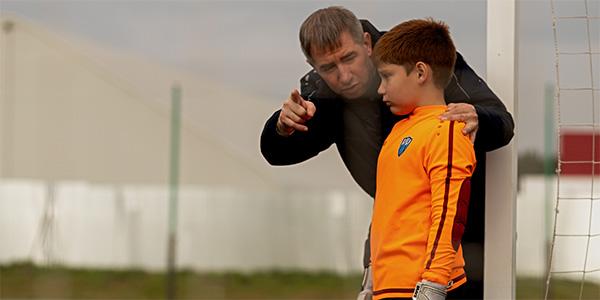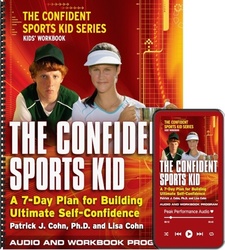
Young athletes Commonly Struggle with Comparison
Summary: Many young athletes struggle with comparing themselves to teammates and competitors, which often hurt the athletes confidence and performance. Constant comparison shifts focus away from their own skills and creates jealousy or intimidation. To build confidence, sports kids should focus on their unique strengths, remind themselves of past successes, and avoid dwelling on others’ abilities.
“My son is very tentative when playing basketball. He always has his eye on what others are doing—his teammates and his opponents. How can we help him play with more confidence?”
This young athlete likely struggles with a common mental-game challenge:
He compares himself to teammates and competitors.
It’s pretty natural for sports kids to compare their performance to others, but it becomes a problem when these comparisons hurt kids’ confidence and performance…
When kids compare themselves to others, they can feel jealous of their teammates and competitors. This can cause friction in a team and also distract your sports kids, who will focus more on how much praise another player got, instead of on their own performance.
In addition, when sports kids focus on others’ strengths, they’re not focusing on their own. The can lead to a drop in confidence. Concentrating on others’ strengths will make your young athletes put others on a pedestal, and feel small in comparison.
It makes it hard for athletes to focus on their performance, stay in the moment, and play freely and intuitively.
If your athletes are comparing themselves to others, it has an impact on the athletes confidence. First find out if your children are feeling intimidated by other potentially higher-skilled athletes. Talk to them about how kids might mature at different times.
While they’re thinking about others’ strengths, they’re also thinking about their own weaknesses, in comparison.
In order to be confident athletes, they shouldn’t dwell on others’ success or abilities…
It’s often easy as parents to compare your athletes to other athletes in the hopes that it motivates them to improve or strive to be better, but comparing them to other stronger athletes can backfire!
Instead, you want your athletes to focus on their own unique talents and abilities. What are their best moments as athletes? Remind them of their unique talents just before games.
The goal is to help your kids become confident players who recognize good players and are excited to test their own skill against them without fear.
In essence, encourage your kids to put their focus where it should be: on themselves and their game!
Your Athletes Confidence
1. Teach Young Athletes to Focus on Their Own Game
Comparison often distracts kids from their own strengths. Encourage athletes to stay in the moment, focus on their unique abilities, and trust their training instead of worrying about how others perform.
2. Remind Kids of Their Unique Strengths Before Games
Boost confidence by pointing out specific skills or past successes. Highlighting their personal bests helps athletes feel empowered and reduces the urge to measure themselves against teammates or competitors.
3. Address Intimidation by Explaining Different Growth Rates
Many athletes compare themselves to peers who may be more physically developed. Remind kids that athletes mature at different times, and progress comes at their own pace. This builds patience and confidence in long-term growth.
4. Avoid Comparing Your Child to Other Athletes
Parents may think comparisons motivate kids, but they often backfire and lower self-esteem. Instead, foster confidence by focusing on effort, improvement, and personal milestones rather than stacking them against others.
Related Sports Psychology Articles
- Six Tips for Dealing with Sibling Rivalry In Sports
- Helping Kids to Cope with “Self-Intimidation”
- 5 Tips for Breaking Free of a Performance Slump
*Subscribe to The Ultimate Sports Parent Podcast
*Subscribe to Peak Performance Sports on Youtube
Download a free sports psychology report to improve your mental game!
The Confident Sports Kid

When kids lack confidence, they doubt themselves, stop taking risks, play tentatively, and are hard on themselves. As a result, kids often lose their motivation to improve. Ultimately, these barriers keep them from enjoying sports and making the most of their physical talent.
“The Confident Sports Kid” program is actually two programs: one that teaches sports parents how to boost their kids’ confidence, and another that teaches young athletes age 8 to 18 how to improve their self talk, avoid negative thinking, overcome expectations that limit confidence, and much more. The program will help kids boost their confidence in sports and life…and enjoy sports more.
FAQ: Building Confidence in Young Athletes
Q: Why is building confidence in young athletes so important?
A: Building confidence in young athletes is crucial because it directly impacts their ability to perform under pressure, focus on their own strengths, and enjoy the game without unnecessary comparisons. Confident athletes are more resilient, motivated, and able to grow through challenges. Comparing hurts the athletes confidence.
Q: How can comparing themselves to others hurt young athletes confidence?
A: When kids constantly compare themselves to teammates or competitors, they may feel inadequate or intimidated. This mindset shifts focus away from their own progress and abilities, leading to frustration and lower self-esteem, which undermines building confidence in young athletes.
Q: What role do parents play in building confidence in young athletes?
A: Parents play a key role by encouraging kids to celebrate their unique talents rather than comparing them to stronger athletes. Positive reinforcement, reminding kids of their past successes, and avoiding harmful comparisons help build lasting confidence.
Q: What are some practical strategies for building confidence in young athletes?
A: Some strategies include teaching athletes to focus on their personal growth, using positive self-talk, setting achievable goals, and reflecting on their best performances. Encouraging kids to trust their training and skills helps them play freely and with greater confidence.
Q: Can building confidence in young athletes improve team dynamics?
A: Yes. When athletes feel confident, they are less likely to be jealous of others or distracted by comparisons. This promotes healthier team relationships, better communication, and a stronger focus on working together to achieve team goals.
4 Ways Comparison’s Impact on Athletes Confidence
Kids Sports Psychology expert Patrick Cohn, Ph.D. has helped athletes for over 35 years to enhance their performance. Dr. Cohn earned a master’s degree in sports psychology from CSUF and a Ph.D. from the University of Virginia, specializing in Applied Sports Psychology. Today, he is the president and founder of Peak Performance Sports, LLC in Orlando, Florida.
